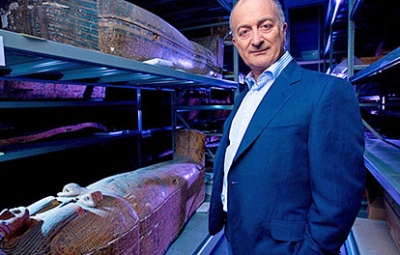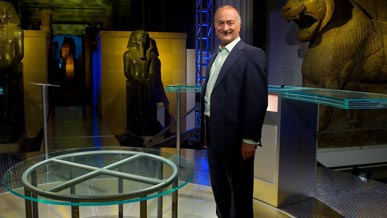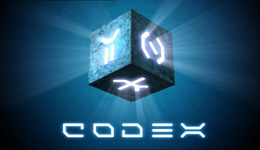Codex
(→Broadcast) |
|||
| (15 intermediate revisions not shown) | |||
| Line 2: | Line 2: | ||
<div class="box"> | <div class="box"> | ||
| + | |||
== Host == | == Host == | ||
| - | Tony Robinson | + | [[Tony Robinson]] |
== Broadcast == | == Broadcast == | ||
| - | + | Diverse for Channel 4, 12 November 2006 to 15 December 2007 (12 episodes in 2 series) | |
</div> | </div> | ||
| + | |||
== Synopsis == | == Synopsis == | ||
| - | + | Cashing in on the success of ''The Da Vinci Code'' just twelve months too late really, Channel Four's Mr History [[Tony Robinson]] invites five history hunters to run round the British Museum in the middle of the night to look at priceless artifacts and solve codes. | |
| + | |||
| + | Each episode has a theme based on a time period and a place (such as Mesopotamia, the Roman Empire, medieval England, Egypt and so on), and the show makes good use of the millions of artifacts at the British Museum to convey the interesting things of the period to the viewer. | ||
| + | |||
| + | The contestants play as a team, but ultimately only one of them will have a shot at the prize. Tony leads the way to each interesting artifact of the period, and after explaining its significance invites the contestants to play a game tied into it. The games are usually on knowledge, memory and observation, and usually involve the team coming up with a certain amount of correct responses within three or four minutes. | ||
| + | |||
| + | The graphics for these have a nice stone cube motif, our biggest problem is that whilst looking very swish and nice, when time is tight it feels as though the team are being rather unfairly punished by waiting for the graphical effect to happen. The time limits already feel rather tight, and despite the multiple choice nature of most of the questions you don't seem to be allowed to get more than one or two elements wrong to have any chance at passing a challenge. On the bright side, the challenges are neatly tied into the artifacts in question, and are dressed up so that it feels like we're getting a lot of variety. They desperately need some sort of progress-o-meter for each game though. | ||
| + | |||
| + | <div class="image">[[File:Codex tony mummystore.jpg|400px]]''Time Team leader - [[Tony Robinson]].''</div> | ||
| + | |||
| + | Successful completion of a game means all the incidences of two letters of the all-important Codex, a riddle consisting of a mild substitution cypher where each symbol represents a different letter, will be automatically revealed and placed. So the more games they win, the easier working out what the Codex says is. The letters are not revealed to the team until the end of the show, but they are revealed for those playing along at home. | ||
| + | |||
| + | There are six challenges, and after all but the second the team is whittled down by a head-to-head question, these are estimated guess questions with numerical answers based on the day's theme. Some might be based on previously seen artifacts, to see how well they've been paying attention. In any case, the contestants give their answer on their whizzy remote control keypads, and the person who is furthest away from the correct answer is eliminated. They have to stay put, but will rejoin the others in helping to crack the Codex at the end of the show. The fact that there's only one type of elimination is a bit of a pity. | ||
| + | |||
| + | Once whittled down to a final player, it's time to crack the Codex. The winner is away from view, the four losers come together in the British Museum's famous Reading Room. On the giant screen lies the Codex, and all the letters they've won are swapped in. They now have three minutes to try and work out what it says using their code cracking skills. The Codex is a riddle which is hinting towards one of five different treasures locked away in another room. | ||
| + | |||
| + | The three minutes up, it's time for our winner to come down the stairs and into the room of the treasures. They have not seen the Codex, and must rely on their teammates to communicate what they've worked out to them. Similarly, the losers have no idea what's inside the room. Hopefully with a bit of common sense and lateral thinking, the evening's winner will pick the right treasure the Codex is hinting at within sixty seconds. Once decided on, the player picks up the cube next to the treasure. | ||
| + | |||
| + | <div class="image">[[File:Codex series2 set.jpg]]''[[Tony Robinson]] on the Series 2 set.''</div> | ||
| + | |||
| + | Once outside, Tony reveals what the Codex actually says (in case the team got it wrong, or didn't convert it all in time) and then tells the winner to open up their cube. Inside is a smaller glass cube, and on the bottom is inscribed "I've cracked [[The Crystal Maze]]!" sorry, "congratulations, you've cracked the ''Codex''" if they've picked the right treasure (in which case the winner's off on a lovely historical holiday, and the losers are very pleased for them because everyone's had a great time) or a note telling them they've lost. | ||
| + | |||
| + | The Crystal Maze comparisons shouldn't be taken lightly, loads of people who worked on it worked on this as well and it shows in its production values and direction. ''Codex'' is highly enjoyable, and if it can sort out a few of its problems (the balancing, Tony Robinson really isn't a natural gameshow host) then it could become truly great. | ||
| + | |||
| + | == Web links == | ||
| + | |||
| + | [http://en.wikipedia.org/wiki/Codex_(TV_series) Wikipedia entry] | ||
| + | |||
| + | == See also == | ||
| + | |||
| + | [[Weaver's Week 2006-12-03|Weaver's Week review]] | ||
| - | + | [[The Quizeum]] | |
[[Category:Action and Adventure]] | [[Category:Action and Adventure]] | ||
| + | [[Category:History]] | ||
[[Category:Puzzle]] | [[Category:Puzzle]] | ||
| + | [[Category:Themed Quiz]] | ||
| + | [[Category:Channel 4 Programmes]] | ||
| + | [[Category:Diverse Productions]] | ||
Current revision as of 20:43, 20 June 2024
Contents |
Host
Broadcast
Diverse for Channel 4, 12 November 2006 to 15 December 2007 (12 episodes in 2 series)
Synopsis
Cashing in on the success of The Da Vinci Code just twelve months too late really, Channel Four's Mr History Tony Robinson invites five history hunters to run round the British Museum in the middle of the night to look at priceless artifacts and solve codes.
Each episode has a theme based on a time period and a place (such as Mesopotamia, the Roman Empire, medieval England, Egypt and so on), and the show makes good use of the millions of artifacts at the British Museum to convey the interesting things of the period to the viewer.
The contestants play as a team, but ultimately only one of them will have a shot at the prize. Tony leads the way to each interesting artifact of the period, and after explaining its significance invites the contestants to play a game tied into it. The games are usually on knowledge, memory and observation, and usually involve the team coming up with a certain amount of correct responses within three or four minutes.
The graphics for these have a nice stone cube motif, our biggest problem is that whilst looking very swish and nice, when time is tight it feels as though the team are being rather unfairly punished by waiting for the graphical effect to happen. The time limits already feel rather tight, and despite the multiple choice nature of most of the questions you don't seem to be allowed to get more than one or two elements wrong to have any chance at passing a challenge. On the bright side, the challenges are neatly tied into the artifacts in question, and are dressed up so that it feels like we're getting a lot of variety. They desperately need some sort of progress-o-meter for each game though.
 Time Team leader - Tony Robinson.
Time Team leader - Tony Robinson.Successful completion of a game means all the incidences of two letters of the all-important Codex, a riddle consisting of a mild substitution cypher where each symbol represents a different letter, will be automatically revealed and placed. So the more games they win, the easier working out what the Codex says is. The letters are not revealed to the team until the end of the show, but they are revealed for those playing along at home.
There are six challenges, and after all but the second the team is whittled down by a head-to-head question, these are estimated guess questions with numerical answers based on the day's theme. Some might be based on previously seen artifacts, to see how well they've been paying attention. In any case, the contestants give their answer on their whizzy remote control keypads, and the person who is furthest away from the correct answer is eliminated. They have to stay put, but will rejoin the others in helping to crack the Codex at the end of the show. The fact that there's only one type of elimination is a bit of a pity.
Once whittled down to a final player, it's time to crack the Codex. The winner is away from view, the four losers come together in the British Museum's famous Reading Room. On the giant screen lies the Codex, and all the letters they've won are swapped in. They now have three minutes to try and work out what it says using their code cracking skills. The Codex is a riddle which is hinting towards one of five different treasures locked away in another room.
The three minutes up, it's time for our winner to come down the stairs and into the room of the treasures. They have not seen the Codex, and must rely on their teammates to communicate what they've worked out to them. Similarly, the losers have no idea what's inside the room. Hopefully with a bit of common sense and lateral thinking, the evening's winner will pick the right treasure the Codex is hinting at within sixty seconds. Once decided on, the player picks up the cube next to the treasure.
 Tony Robinson on the Series 2 set.
Tony Robinson on the Series 2 set.Once outside, Tony reveals what the Codex actually says (in case the team got it wrong, or didn't convert it all in time) and then tells the winner to open up their cube. Inside is a smaller glass cube, and on the bottom is inscribed "I've cracked The Crystal Maze!" sorry, "congratulations, you've cracked the Codex" if they've picked the right treasure (in which case the winner's off on a lovely historical holiday, and the losers are very pleased for them because everyone's had a great time) or a note telling them they've lost.
The Crystal Maze comparisons shouldn't be taken lightly, loads of people who worked on it worked on this as well and it shows in its production values and direction. Codex is highly enjoyable, and if it can sort out a few of its problems (the balancing, Tony Robinson really isn't a natural gameshow host) then it could become truly great.


